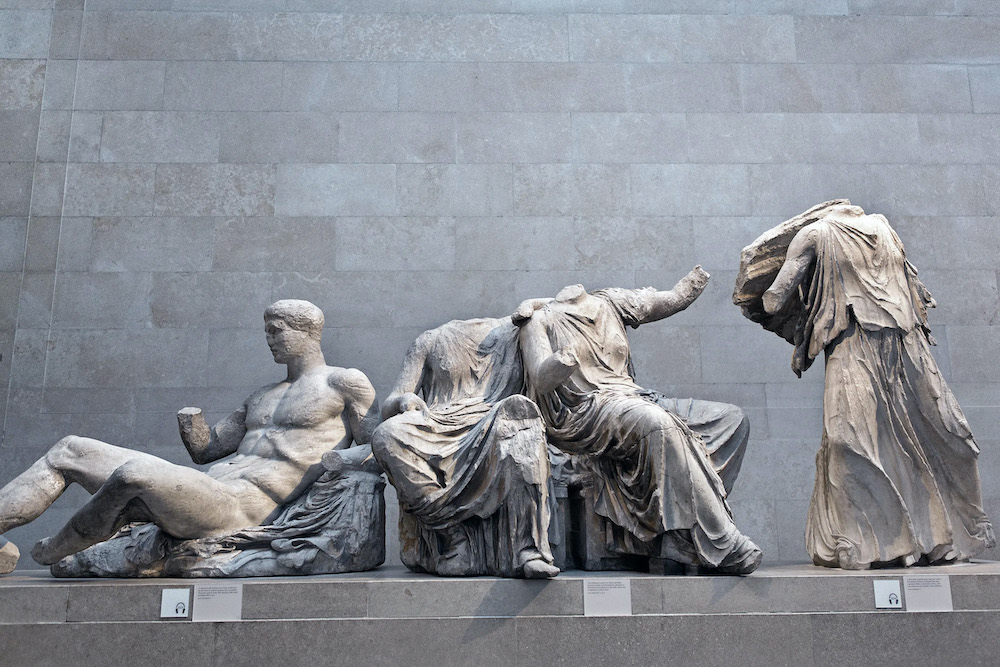Great Britain is in serious decline. The City has lost its position as Europe’s indispensable financial center, the UK economy is in recession and its vaunted National Health Service is in shambles. The Tories have ruled Britannia for 12 straight years, much of it in dealing with a self-imposed catastrophe known as Brexit under the inept leadership of Cameron, May and Johnson. Then there was Liz Truss who served as Prime Minister for about 60 days—the only thing she will be remembered for is formally presenting herself to QE2 who promptly died. Queen Elizabeth served more than 70 years as one of most vapid monarchs in the kingdom’s long history, only to be succeeded by the insipid King Charles III.
Symbolic of the long decline and fall of the British Empire is the possible loss of the most important artistic treasure in England—the Parthenon Marbles, which have been on display in the British Museum for two centuries. An impending deal for the Parthenon Marbles to be returned to Greece at long last is being negotiated. After decades of false starts, a return or loan of at least some of the marbles seems likely.
In the early 19th century, most of the surviving sculptures from the Parthenon pediments and at least half of the spectacular frieze spanning the interior walls of the ancient Greek temple—considered to be the most beautiful building of antiquity—were commandeered by Thomas Bruce, the 7th Earl of Elgin, the British ambassador to the Sultan of the Ottoman Empire (Greece was ruled by the Ottoman Turks at the time).
Elgin’s prime mission was to save the treasures of the Parthenon from theft or destruction. He concluded that to save them he had to ship them to England. To do so, he spent much of this own fortune to bribe the Sultan’s retinue and received a firman, a type of edict from the Sultan, which gave him putative authority to ship the marbles and other items from Acropolis temples to England, where he intended to display them at a private museum. However, a divorce cost him the rest of his fortune and he sold the marbles at a loss to the government, which installed them in the British Museum in 1817. They have been on display there ever since.
When Greece won its freedom from the Ottomans, shortly after Elgin spirited away the marbles, the Greeks demanded their return. The British refused. The romantic poet Lord Byron, who fought for Greece’s independence, was a vocal critic of British no-return policy and expressed his views in verse. Over the last two centuries, the British steadfastly refused to budge, claiming that Elgin paid for the marbles and that their government has clear legal title.
The British Museum (commonly referred to as the BM) is a must for anyone visiting London. Where else can you view the original Rosetta Stone and dozens of other spectacular ancient Egyptian monuments. The last time I was in London, I spent a couple of hours viewing the Parthenon marbles. It’s the third time I have seen them and each time I came away with awe at their beauty, and a disquieting sense that these items belong in Greece, at home with what is left of the Parthenon.
A Greek newspaper reported last December that there were serious negotiations between the Greek prime minister and George Osborne, a former Chancellor of the Exchequer who is now chairman of the BM. The newspaper said that the deal was centering on an arrangement where the British would “loan” the marbles for a period of at least 20 years in exchange for Greece lending the UK a rotating selection of antiquities. Of course, the Greeks hope that after 20 years the loan would become permanent. The New York Times reported that the Brits offered to loan the Greeks no more than a third of the Parthenon artifacts and for a much shorter time period.
The return of antiquities to native art institutions is a growing concern for museums world-wide as the countries of origin make more frequent demands. Last year the Smithsonian returned 30 Benin Bronzes to Nigeria. Germany also repatriated 20 of the bronzes. But some art institutions are digging in, fearing that their prime treasures will be taken away.
The BM needs a renovation, estimated to cost one billion pounds, and as it attempts to raise funds, patrons may hesitate to donate, turned off not only by the possible loss of the Parthenon marbles, but by the pressure to return its collection of Benin Bronzes and Egyptian antiquities, including the Rosetta Stone, to their native countries. Will the empire strike back?


